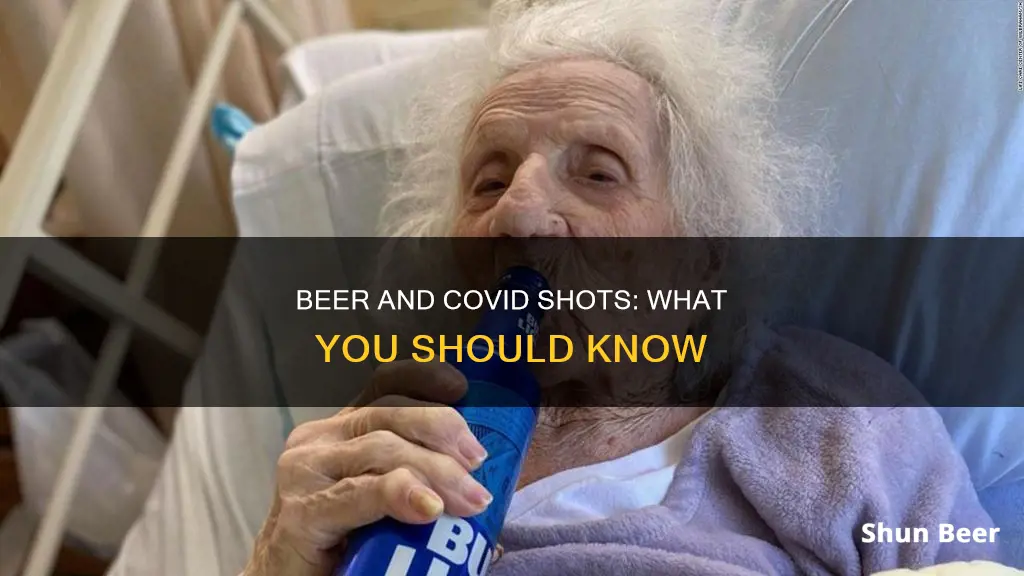
There is no definitive research on the impact of drinking beer after receiving the COVID-19 vaccine or booster shot. However, experts agree that excessive alcohol consumption can negatively impact the immune system, increasing susceptibility to infections and potentially hindering the body's ability to build immunity after vaccination. Moderate drinking, defined as no more than two drinks per day for men and one drink per day for women, is generally considered unlikely to impair the immune response to the vaccine. Nonetheless, it is recommended to avoid alcohol the day before and after vaccination, as it can suppress the immune system and cause dehydration, which may worsen potential side effects.
What You'll Learn

Heavy drinking may hinder your immune system
Drinking beer or any other alcoholic beverage after receiving a COVID-19 shot is generally considered safe, as long as it is done in moderation. However, it is important to note that heavy drinking may hinder your immune system and impact your body's ability to respond to the vaccine.
Heavy drinking is defined differently for men and women. For men, it typically refers to consuming more than 4 drinks in a day or 14 to 15 drinks in a week. For women, heavy drinking is considered to be more than 3 drinks in a day or 7 to 8 drinks in a week. These definitions may vary slightly depending on the source or specific guidelines being referred to.
Chronic and heavy alcohol consumption can have detrimental effects on the immune system. Alcohol is a toxin that the liver has to process and flush out of the body. Excessive drinking can overwhelm the liver, leading to scarring, cirrhosis, and alcoholic fatty liver disease. Additionally, heavy drinking can increase the risk of heart disease, high levels of fats and cholesterol, and blood clots. It can also cause mental health issues such as depression and dementia, as well as nerve damage and sleep disruptions.
Heavy drinking can also directly impact the immune system's ability to fight off infections. Alcohol can hamper the function of immune cells, making it harder for the body to defend itself against viruses and bacteria. This weakened immune response can make individuals more susceptible to infections and may interfere with the effectiveness of vaccines, including the COVID-19 shot.
It is important to note that moderate drinking, which is generally defined as no more than 2 drinks per day for men and a maximum of 1 drink per day for women, is not expected to significantly impair the immune response to the COVID-19 vaccine. However, it is still crucial to drink in moderation and be mindful of the potential risks associated with excessive alcohol consumption.
Beer Drinking Post-Whipple: What You Need to Know
You may want to see also

Moderate drinking is unlikely to affect your vaccine response
Moderate drinking is unlikely to affect your immune response to the Covid vaccine. According to Ilhem Messaoudi, director of the Center for Virus Research at the University of California, Irvine, who has conducted research on the effects of alcohol on the immune response, "If you are truly a moderate drinker, then there's no risk of having a drink around the time of your vaccine."
Moderate drinking is generally defined as no more than two drinks a day for men and a maximum of one drink a day for women. Heavy drinking, on the other hand, is defined as four or more drinks on any day for men and three or more drinks for women. Chronic, heavy drinking and binge drinking can suppress your immune system and negatively impact your vaccine response.
Some studies have even found that, over the longer term, small or moderate amounts of alcohol might benefit the immune system by reducing inflammation. Studies on macaques (monkeys), rats, and people have found some evidence that moderate alcohol consumption is associated with improved cardiovascular health and possibly immune health. However, much more research is needed to back these findings.
While there is no firm answer on whether or not you can drink alcohol after getting the Covid vaccine, most health officials advise against it due to the potential for compounding vaccine side effects, such as muscle aches and pains, with the side effects of alcohol. However, according to Dr. Mark Loafman, chair of family and community medicine for Cook County Health, "There's no prohibition against drinking alcohol... excessive doses of alcohol... have a weakened immune system and that makes them more susceptible to infection and may weaken their response to a vaccine."
Crafting Gin and Ginger Beer Cocktails at Home
You may want to see also

Alcohol can be mixed with some painkillers
Drinking alcohol after receiving a COVID-19 vaccine or booster shot is generally considered safe in moderation. However, excessive alcohol consumption can lead to a weakened immune system and potentially interfere with your vaccine response. It is recommended that women should not exceed one drink per day, and men should limit themselves to no more than two drinks per day.
Regarding the question of mixing alcohol with painkillers, it is important to note that this combination can be dangerous and even deadly. Alcohol interacts with certain medications, including painkillers, and can lead to severe health consequences. Even over-the-counter painkillers like ibuprofen and prescription opioids like oxycodone can have harmful interactions with alcohol. Mixing alcohol with opioids can cause drowsiness, memory problems, and breathing difficulties, increasing the risk of accidental overdose. It is crucial to consult a doctor or pharmacist to understand the specific interactions and risks associated with any medication you are taking.
While moderate drinking for females is defined as one drink per day and for males as two drinks per day, it is important to be mindful that alcohol affects women differently than men. Due to biological and chemical differences, women absorb more alcohol, and it takes longer for their bodies to metabolize it. As a result, women are at a higher risk of long-term negative health consequences from alcohol consumption compared to men.
If you are experiencing side effects from the COVID-19 vaccine or booster shot, it is important to choose your pain reliever carefully. Acetaminophen (Tylenol) should be avoided if you plan on drinking alcohol, as the combination can cause liver injury. On the other hand, ibuprofen (Advil) can be safely taken with alcohol. Always remember to follow the advice of your healthcare provider and read the medication leaflet to ensure you are taking the appropriate dosage and avoiding harmful interactions.
In summary, while moderate alcohol consumption after receiving a COVID-19 vaccine or booster shot is generally considered safe, mixing alcohol with certain painkillers can be dangerous. It is crucial to understand the interactions between alcohol and your specific medication and to always consume alcohol in moderation.
Shingles and Beer: A Safe Mix?
You may want to see also

Drinking guidelines for men and women differ
The definition of moderate drinking is critical when it comes to alcohol consumption and its impact on the immune response to the COVID-19 vaccine or booster shot. Moderate drinking is generally defined as no more than one drink per day for women and a maximum of two drinks per day for men. Excessive alcohol consumption, on the other hand, defined as three or more drinks for women and four or more drinks for men, can lead to a weakened immune system and potentially interfere with the vaccine response.
While moderate drinking is unlikely to impair the immune response to the COVID-19 vaccine or booster, heavy drinking might. This is because excessive alcohol consumption can suppress the immune system, making individuals more susceptible to infection and reducing their body's ability to generate protective levels of antibodies. Therefore, it is recommended to adhere to the drinking guidelines for men and women to maintain a healthy immune response, especially after receiving the COVID-19 vaccine or booster shot.
It is worth noting that the drinking guidelines are based on averages and individual tolerance may vary. Additionally, drinking guidelines do not consider other factors such as age, weight, height, and health conditions that may impact alcohol metabolism and tolerance. As such, it is always important to drink in moderation and be mindful of your body's limits. If you have any concerns or questions about your alcohol consumption, it is recommended to consult a healthcare professional.
Understanding Beer Columns: Brewing Process Simplified
You may want to see also

Alcohol-free beer is an option
If you're looking to celebrate getting jabbed with a beer, but are concerned about the potential impact of alcohol on your immune response, then alcohol-free beer could be a good option for you. While there is no definitive research on the impact of alcohol on vaccine effectiveness, experts agree that heavy drinking can negatively impact your immune system.
According to Dr Ilhem Messaoudi, director of the Center for Virus Research at the University of California, Irvine, "it's dangerous to drink large amounts of alcohol because the effects on all biological systems, including the immune system, are pretty severe and they occur pretty quickly after you get out of that moderate zone." Chronic, heavy alcohol use will impact your immune system response and lower your immunity. Even a single episode of binge drinking can hinder your immune system.
Moderate drinking, on the other hand, is generally considered to be fairly benign in terms of its impact on the immune system. Moderate drinking is defined as no more than two drinks a day for men and a maximum of one drink a day for women. So, if you're going to drink, it's important to drink in moderation.
However, it's worth noting that alcohol can also have other negative health consequences. For example, combining alcohol with certain medications, such as acetaminophen, can cause liver damage. Alcohol can also increase the risk of acute respiratory distress syndrome and pneumonia, which are sometimes associated with COVID-19.
So, if you're looking to celebrate with a beer after your COVID shot, opting for an alcohol-free option could be a wise choice. That way, you can avoid any potential impact on your immune response and other negative health consequences while still enjoying a refreshing beverage.
Is Expired Beer Safe to Drink?
You may want to see also
Frequently asked questions
There is no definitive research on the impact of drinking beer after getting the COVID-19 vaccine. However, moderate drinking is unlikely to impair your immune response, while heavy drinking might.
Moderate drinking is defined as no more than one drink per day for women and no more than two drinks per day for men.
It is best to avoid drinking alcohol before getting the COVID-19 vaccine. It is important to arrive at your appointment with a clear frame of mind and be able to give clear-headed consent to receiving the vaccine.
If you are taking acetaminophen (Tylenol) to manage side effects after getting the COVID-19 vaccine, avoid drinking alcohol. Combining acetaminophen and alcohol can cause liver injury.
The Centers for Disease Control and Prevention (CDC) states that there is currently no evidence that drinking alcohol will make the COVID-19 vaccination less effective or unsafe. However, the CDC recommends avoiding alcohol the day before and after getting the vaccine as it can suppress the immune system and cause dehydration.







